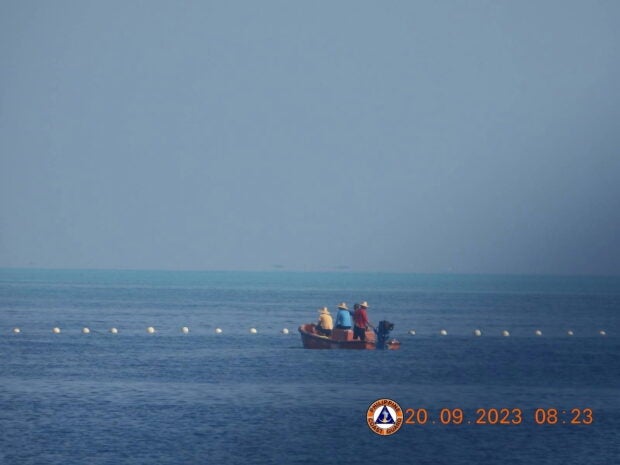
‘DANGER TO PASSING FISHING BOATS’ | A 300-meter stretch of booms is found at Bajo de Masinloc (Scarborough Shoal), which the Philippine Coast Guard (PCG) and the Bureau of Fisheries and Aquatic Resources said was installed by the China Coast Guard on Friday. (Photo from the PCG)
MANILA, Philippines — Two senators have criticized floating barriers by Chinese vessels, who were caught putting up these floating devices at Bajo de Masinloc (Scarborough Shoal) off Zambales province.
The Philippine Coast Guard (PCG), who caught these Chinese vessels setting up these booms, said these floating devices were intended to block Filipino fishing boats.
Zubiri to PCG: Remove floating devices
Senate President Juan Miguel Zubiri on Sunday asked the PCG to remove the floating devices, which the Chinese vessels installed there.
Zubiri said these obstructions were not allowed within the country’s 370-kilometer exclusive economic zone (EEZ).
“They have no right to put any structures within our [EEZ and] these structures pose a danger to passing fishing boats that can get entangled with the lines and cause considerable damage to the propellers and engines of [sea vessels],” he told reporters.
Sen. Risa Hontiveros joined Zubiri in lambasting China’s latest hostile action in the West Philippine Sea (WPS).
“China’s cruelty knows no bounds. They have no shame in aggressively blocking our fishermen in our own seas,” she said.
“We should no longer accept acts like this going unpunished. If we allow China’s bullying to continue, it will cost the lives of our own people,” she warned.
‘Captured on camera’
The PCG and the Bureau of Fisheries and Aquatic Resources (BFAR) on Sunday accused the China Coast Guard of installing the 300-meter “floating barrier” at Bajo de Masinloc to prevent Filipino boats from entering their traditional fishing ground.
The booms were discovered while BFAR’s vessel BRP Datu Bankaw, manned by the PCG, was on a routine maritime patrol on Sept. 22.
“The most important incident that we monitored with this maritime patrol… is that we captured on camera that the Chinese coast guard deployed their three rigid hull inflatable boats together with the service boat of one of the Chinese maritime militia vessel in installing floating barriers” in Bajo de Masinloc, PCG spokesperson for the West Philippine Sea Commodore Jay Tarriela said in a press briefing.
The Chinese vessels were “in a hurry to install those floating barriers because they monitored that there was a BFAR vessel and there was also a large number of Filipino fishing vessels” in the vicinity, he said.
The PCG did not remove the barriers yet because, as Tarriela explained, “we intend to document this for the National Task Force on the West Philippine Sea to learn about this particular activity of [China] and then we’re going to leave it to them as to whatever legal or diplomatic action is necessary.”
BOUNDARY ON WATER | Booms which the Philippine Coast Guard (PCG) said were installed by the China Coast Guard are seen from another vantage at Bajo de Masinloc. (Photo from the PCG)
Amicable resolution
The PCG and BFAR, in a joint statement, said they “strongly condemn” the installation of the floating barriers, “depriving [Filipino fishermen] of their fishing and livelihood activities.”
Despite China’s frequent aggressive actions in the West Philippine Sea, the Philippines has reiterated that it continues to advocate an amicable resolution of disputes and has called for adherence to international law to keep the Indo-Pacific region “open, free, stable and peaceful.”
Speaking on behalf of President Marcos at the 78th session of the United Nations General Assembly in New York City on Saturday, Foreign Secretary Enrique Manalo told member nations that the “preservation of a rules-based global order is our collective responsibility.”
The Department of Environment and Natural Resources (DENR), meanwhile, has denounced the reported destruction of coral reefs and marine ecosystems in the West Philippine Sea.
“Harmful human interference, such as the destruction and illegal exploitation of any part of our marine ecosystem is a loss, not only to our country, but to the region and to the world,” the DENR said in a statement released on Sept. 22 following the signing of the first-ever treaty on protecting the international high seas at the United Nations.
According to the department, scientific studies had established that the marine ecosystem in the Kalayaan Island Group was crucial for the supply of fish and coral larvae in the country and the region.
“We, therefore, strongly deplore any activity that leads to the damage and destruction of the coral reefs in the Kalayaan Island Group,” DENR said, adding that it was ready to support the concerned government agencies currently exploring legal options that the country might pursue.
—WITH REPORTS FROM TINA G. SANTOS, JANE BAUTISTA, AND REUTERS

